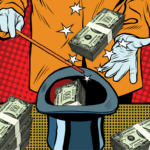It’s the busy time for almost everyone in fundraising. The make-or-break time of year where you hit budget – or not. You’ve been going full speed for several weeks, and you have a few weeks to go before you can even think about slowing down … much less taking some time off.
For now, some smart steps can help you survive, and I have a few that have worked for me and for others through the years.
First, let me give you a piece of really terrible advice that kind of works: Just power through.
That’s not useful advice, because it’s not something you can choose to do. It’s sometimes all that an out-of-their-depth boss can come up with.
But I think it’s useful in one small way. It’s an acknowledgement of reality. Sometimes when things get tough, we try to “bargain” our way out of it, making “deals” with ourselves that we don’t have the power to make. When you acknowledge reality, you can stop wasting time and energy looking for non-existent escape hatches.
With that not-so-great advice out of the way, here are a few things that actually might help you this year…
Track your time
This might seem pointless, just another duty to add to the pile. But there’s a reason this may be worth doing: When you know what you’re doing with your hours, you have more control. Untracked time can fall into a black hole, leaving you with less time than you thought you had.
I learned to track my time during my long years in agencies. We had to keep timesheets to account for everything we did: What tasks, and for which clients. We even had a category called “Admin” that accounted for sharpening pencils, cleaning off your desk, and other things you have to do but probably shouldn’t be billing clients for.
I hated tracking my time. But I learned something important: Time is all we have. Sure, we also have know-how and talent, but that can only come out in time. My decades-long forced adaption of time tracking made that truth instinctive for me, and I’m better for it.
You don’t need to make it complex, with billing codes and hourly rates like the agency does. Just keep a document or spreadsheet where you write down what you do and for how long every day. Keep it up as you go, because trying to reconstruct it later takes a lot of time. You may hate doing it as much as I did, but I think you’ll soon be benefitting from a better relationship with your time.
Don’t multitask
Doing several things at once may seem efficient. It may even feel cool, as if you’re some kind of master of the universe taking care of everything all at once. Your bosses and colleagues may even see you multitasking and think you’re some kind of productivity hero.
But multitasking is one of the most destructive ways to spend your time.
That sense that you’re getting two or three times as much done is an illusion. You’re getting less done when you multitask.
This is important: Do one thing at a time. Be conscious about ending one task and starting the next task. When you float between two or more tasks at once, you keep yourself in a state of transition, which makes you far less effective. Don’t waste your time with multitasking!
Control procrastination
Procrastination is a dysfunctional way we try to deal with too much work. (Trust me, I know this because I struggle with it all the time!) The urge to procrastinate often rises when we can least afford to procrastinate. Here are some ways to control it:
- Start small. Progress is the key. You don’t have to summit your Mt. Everest today – you just need to get farther up the mountain.
- A to-do list can be a helpful way to organize your work. But be aware that it can also be a tool for procrastination, if you find you’re endlessly re-ordering and re-prioritizing it.
- Finish projects as quickly as you can. This may be a little in conflict with “start small,” but it’s good to check things off. When you’re approaching the end of a task, make a push to complete it.
- Forgive yourself. Everyone procrastinates. When you realize you’re doing it, just move on. Don’t beat yourself up. That’s just another way to procrastinate!
Manage Time-Wasters
We have so many productivity tools that can easily become serious time-wasters. It takes some discipline to seize control over these things.
- Email. This is the biggest time-suck in the modern workplace. You need to be aware of this. Commit to certain times when you check your email, and ignore it the rest of the time. Make sure you don’t get notifications every time you get a message. You know that most of them are useless newsletters or things that don’t need your attention now (or maybe ever).
- Telephone, including texts, Slack, and other things designed to interrupt. Put your phone on silent. Put it where you can’t see it. Check it at pre-determined times. (But make it possible for actual emergencies to break through!)
- Meetings. Block your calendar to keep your day from filling up with meetings. They can wait!
Give yourself a break
Yes, even during the busiest times, give yourself breaks. Take a walk. Play a quick game of Sudoku. These little breaks can keep your energy up, especially when you do them consciously.
Then, after the extreme time calms down, give yourself a much bigger break!
Being an effective fundraiser is about a lot more than fundraising techniques. It takes your whole heart and mind. That’s why you should join The Fundraisingology Lab by Moceanic. You’ll get the tools, the information, and the supporting community that will take you to new places in your fundraising career.
Related Blog Posts:










